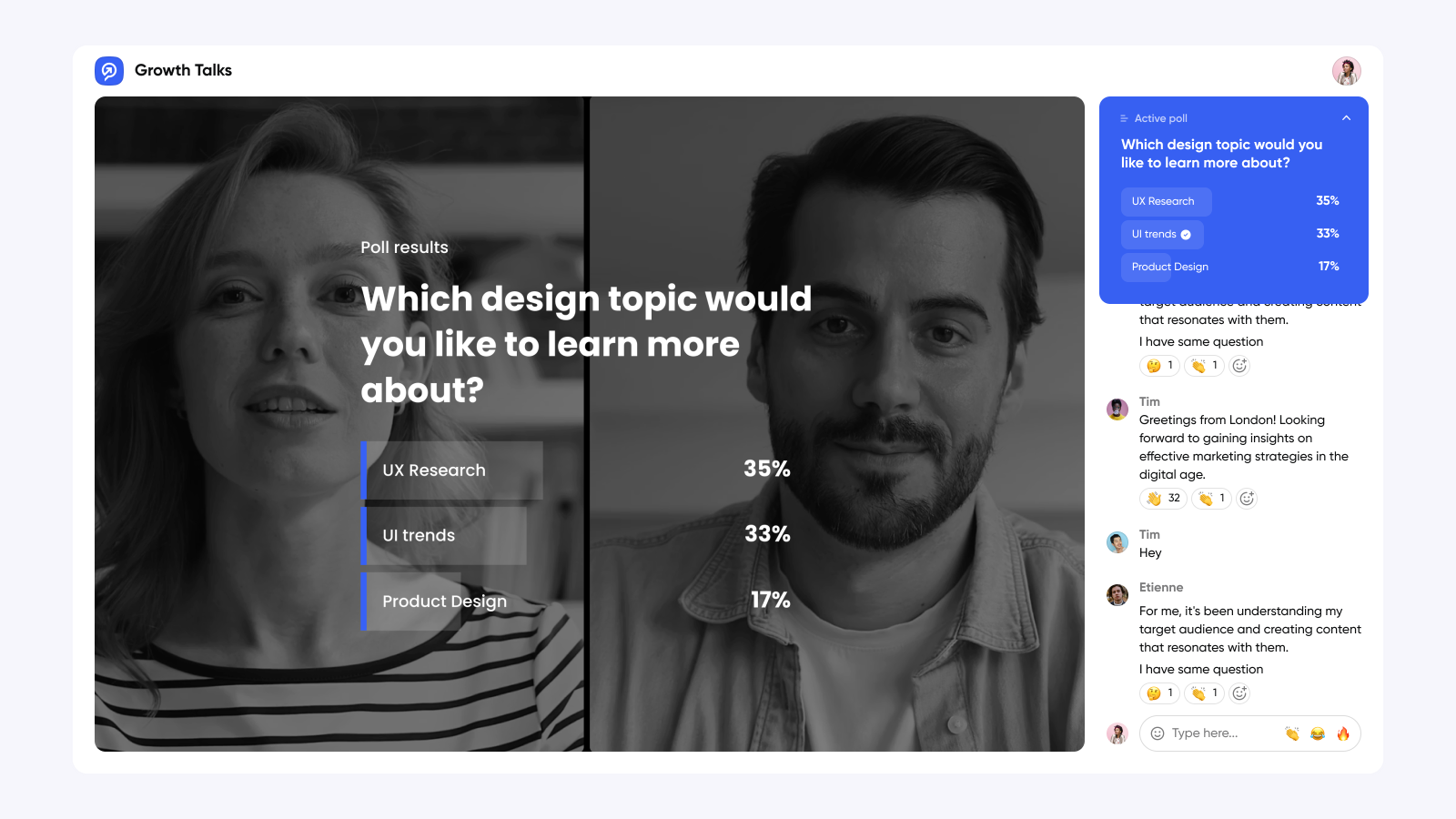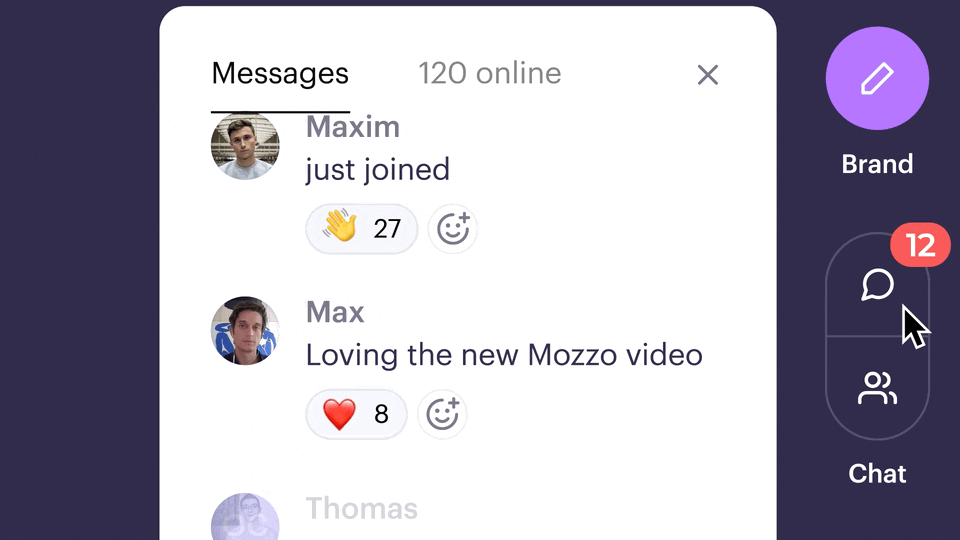Introduction
Welcome to the world of successful webinar hosting.
Think back to a time you attended an event, mesmerized by a speaker who captured your attention and held it till the end. Now, imagine if you had the inside track on precisely what questions event organizers posed to cherry-pick such engaging speakers. Intriguing, isn't it?
That's what we're about to unravel.
Moving beyond the glitz and glamor of perfectly executed events, there exists a reality, a structured process that aces the art of hosting. It's not a secret recipe but a methodical approach, and it all starts with strategically picking the right speakers. Today, we're lifting the curtain on the most revealing questions successful event organizers ask their prospective guest speakers. Set aside any preconceived notions - the answers might surprise you.
Engaging Guest Speakers: The Questions that Make a Difference
- Discover the value of targeted questioning.
- Unearth crucial pre, during, and post-event questions.
- Learn how the right questions can enhance efficiency and progression.
The Importance of Asking the Right Questions
In the world of webinar planning, understanding the significance of asking thought out and strategic questions makes a significant difference. When it comes to guest speakers, concrete questions aligned with your event's goals can pave the way for success. Event organizing is no easy task, and it becomes even more demanding when you're dealing with high-profile guest speakers. These personalities often have specific requirements, refined preferences, and expectations.
Asking the right questions to your guest speakers puts you a step ahead in planning, coordination, and execution, reducing the chances of unpleasant surprises. It allows you to align your planning initiatives better, preparing efficient responses to potential challenges down the line.
Top Questions to Ask Before the Event
Before putting down your name, brand, and reputation on an event, thorough preparation is essential – and that includes picking the brain of your guest speaker. Initial communicative clearness can set the tone for smooth preparation and execution.
Bring your speaker into the webinar green room (or webinar Studio) to prepare the event with them. Make sure they are familiar with the webinar tool you are going to use all while preparing for the upcoming event.
Understanding The Speaker's Needs
Start with questions about their presentation content - Does the speaker have any specific audio-visual requirements? Do they prefer a certain format for their presentation? Do they need a specific setup on stage? This not only shows respect for their professional needs but also ensures there are no technical hiccups on the day.
Don't forget to test the webcam and mic of your speakers.
Aligning With Event Objectives
Other crucial pre-event questions include inquiring about any special announcement or introduction preference, understanding their comfort with audience interaction, and their chief talking point preferences aligning with your event goals. You can also cover the webinar script to make sure that it is clear for everyone involved in the event.
Essential Questions During the Event
While pre-event questions set the stage, asking relevant questions during the event ensures smooth sailing. The webinar moderator will be the person asking these questions and ensuring that the event runs smoothly. As an organizer, you need to stay aware and vigilant about the guest speaker's comfort and engagement levels.
Ensuring Comfort
During the event, regular check-ins about their comfort, the audience's response, and their need for any immediacies can aid in running things more efficiently.
Facilitating Effective Engagement
Questions to assess the speaker's perspective on audience understanding, their willingness for spontaneous audience questions, and any revelation about their post-event availability for audience interaction could also be asked.
Leverage polls during the event to assess audience engagement and create an interactive experience between your guest speakers and your audience.

Post-Event Questions for Continuous Improvement
The last lap of the interaction with your guest speaker doesn't wind up with the event's closure. Asking reflective questions post-event offers valuable feedback, helping you improve the future endeavors.
Gathering Feedback
Inquire about the speaker's overall experience - Were they pleased with the event setup, audience engagement, and event management?
Gauging Future Interest
Also, understand their willingness for future event participation. This not only helps maintain healthy professional companionship but could also be a boon for your future planning phase.
Engaging with guest speakers in a thoughtful, observant, and thorough manner, reflected in the questions you ask, can be a game-changer in your event organizer career.


The Easiest Webinar Platform for You and Your Guests
Start for free up to 30 registrants. No credit card needed.
Start for freePreparing for Guest Speakers: The Questions You Can't Ignore
TL;DR:
- A successful event heavily relies on a clear understanding of the speaker's needs and expectations.
- Curiosity about the speaker's content and presentation style guarantees a coherent, effortless experience for attendees.
- Enquiring about the speaker's technical requirements eliminates last-minute surprises.
Understanding the Speaker's Needs and Expectations
A talk's success hinges on aligning with the speaker's needs and satisfaction. It's crucial to create an environment where speakers can seamlessly deliver their content without stress related to their overall comfort and requirements.
An empathetic approach involves understanding the speaker's needs holistically. This could involve preferences in terms of rhythm or languages used, and timelines. By handling these details attentively, event organizers can generate a trustful relationship, enabling the speaker to focus on their presentation fully.
Moreover, anticipating the speaker's expectations involves gauging the desired level of interaction with the attendees. This crucial detail can shape the design of the Q&A session or the networking opportunities planned around the speech. When coordinated well, these aspects profoundly enhance the speaker-audience connection.
Questions about the Speaker's Content and Presentation Style
Distinct speakers have varying content delivery styles, and syncing with them yields a cohesive experience for listeners. Dissect their content preferences early on to facilitate a better audience experience.
Approaching the speaker's slides and raw content with curiosity aids in integrating it cohesively with the event's theme. Exploring their presentation style — whether they enjoy a casual or formal approach, prefer visuals over words, or thrive with audience interaction — helps set the stage in a way that calms the speaker and grips the audience.
Furthermore, consider adding visuals or diagrams here to illustrate diverse presentation styles to emphasize the point. Understanding the expected length of the webinar, opportunities for breaks, and respect for timing demonstrates professionalism and a genuine interest in the speaker's comfort and success.
Answers to these questions can also help with webinar promotion — leverage the guest speaker's unique presentation style to create hype and excitement around an event and drive more registrations.
Questions about the Speaker's Technical Requirements
In a tech-driven age, understanding the speaker's webinar setup is no less than essential. Inquire about device compatibility, software necessities, and the importance of live/digital aids for the speech.
Event hosts should understand if speakers prefer to control their slides or if they will need an off-stage assistant. Clarifying internet speed demands for live-streaming or pre-recording aspects is also a detail that event organizers can't ignore.
Lastly, establishing a backup plan for unforeseen technical glitches portrays foresight. Proactively discussing this with speakers not only builds trust but also ensures a smooth event despite unforeseen circumstances.
Want to help your guests be the best possible? Check out our list of webinar essentials.
Guest Speaker Expectations: What They Want You to Ask
- Speakers have their own objectives in events
- Every speaker has a unique style for audience interaction
- They have specific ways they like follow-ups handled
Knowing the speaker's aims ahead of time helps you navigate their presentation smoothly. Every speaker will have specific objectives and outcomes in mind. They might want to promote their brand, impart knowledge, or provide inspiration. By understanding these goals, you will assist in creating a conducive atmosphere where the speaker and the audience can mutually benefit.
Understanding the Speaker's Goals for the Event
Full awareness of the speaker's objectives represents a respect for their expertise and intentions. It decreases the risk of misunderstandings or missed opportunities. Ask about their primary message, their expected takeaways for the audience, and how they'd like this message to impact attendees. This knowledge will guide your choice of webinar topic, as well as planning and execution — creating an event that meshes seamlessly with the presenter's goals.
Questions about the Speaker's Preferred Audience Interaction
Knowing how a speaker plans to interact with the audience can greatly impact the setup and structure of your event. Some speakers enjoy interactive sessions filled with Q&A, while others prefer a lecture-style format with limited interruptions, and some prefer panel discussions. By asking about their preferred audience interaction, you can ensure the venue, schedule, and technological support matches the speaker's style.
Moreover, understanding the speaker's interaction preferences helps in setting the right expectations for the audience. This could include preparing them for interactive sessions, or giving them guidelines on when and how they can ask questions.
Questions about the Speaker's Follow-Up Preferences
The conversation doesn't end when the speaker leaves the podium. An effective follow-up can heighten the value of the event and foster ongoing relationships between the speaker, your organization, and the audience. Each speaker might have different follow-up preferences. They might like to provide additional resources, schedule Q&A sessions, or perhaps they prefer email communication.
Understanding these preferences lets you support their follow-up effectively. You could set up appropriate channels for these activities, manage logistics, and abide by any timing or format requests the speaker has. This not only enhances the reputation of your organization but also maximizes the value your audience gains from the event.
Guest speakers can also help with the distribution of the on-demand webinar, helping drive more views even after the live.
Without extremely focusing on every detail, understanding the speaker’s goals and preferences can make or break a successful event. The more aligned you are, the smoother event execution will be, leading to a more impactful and engaging experience for your audience.
Guest Speaker Interaction: How to Facilitate Meaningful Conversations
- Effective event organizers play a critical role in sparking impactful discussions
- Maximizing audience participation through thought-provoking questions
- Tactics for handling Q&A sessions smoothly
The Role of the Event Organizer in Facilitating Audience-Speaker Interaction
The event organizer shoulders a tremendous responsibility during speaker sessions. They choreograph a dance that often forms a significant part of the event’s success. Far beyond simply introducing the speaker, the organizer must create a conducive environment that encourages both openness from the speaker and engagement from the audience. Learning how to moderate a webinar is not an easy task. It involves striking a balance; creating a transparent platform for audience-speaker interaction while ensuring the conversation stays within the event's focus. This responsibility often necessitates understanding the speaker's content well enough to direct flow and moderate discussions aptly.
Although deemed behind-the-scenes, this role often influences the direction, pace and overall outcome of the session. To ensure a successful event, organizers must practice active listening and engage with the speaker themselves. This personal engagement sets the tone for the audience, demonstrating that their questions, ideas, and opinions are valuable to the discourse.
Questions to Encourage Audience Participation
It's no secret - audience engagement often sets apart exceptional events from mediocre ones. The key to cultivating this is through thoughtful, invigorating questions that draw out audience participation. Rather than leaning on the general 'Any questions?' statement, event organizers can proactively craft queries that stimulate thought and conversation.
One effective strategy is posing open-ended questions tailored to the speaker's topic. These could spark a new perspective, revealing angles and insights that might have otherwise gone unnoticed. Additionally, event organizers can encourage the audience to share their experiences or ask questions of their own. This active participation cultivates a certain sense of camaraderie and shared learning between everyone involved.
How to Handle Q&A Sessions Effectively
Q&A sessions breathe life into events. They invite the audience to engage, contribute, and share their thoughts and questions. However, the essence is not that questions are asked, but how they're handled. Event organizers should approach these sessions with a clear strategy.

Establishing ground rules at the start can help manage expectations; setting boundaries for question relevance, respect towards the speaker and time limits for each individual's contribution. Organizers should remain alert, interjecting where needed, and clarifying questions when necessary. They should also assume the role of cheerleader, commending good questions and contributions. This not only boosts engagement but also encourages and rewards audience participation.
Keeping a session lively, yet respectful and inclusive, involves aw well-thought-out approach. But when executed well, it often marks a memorable interaction between the speaker and audience.
Guest Speaker Feedback: The Questions that Drive Improvement
- Regular feedback from guest speakers can enhance event planning
- Gauging speakers’ satisfaction with the event helps shape future preparations
- Understanding the audience's perception of the speaker can inform selection process
The Importance of Feedback for Event Success
Importance can't be overstated; careful feedback analysis is crucial to enhancing event management strategies. Regular speaker feedback provides real-world, in-depth perspectives on what went right, what could have been better, and where opportunities for significant improvement exist. It's a tool that should not be underestimated or ignored. It's the key to evolving the event experience and ensuring a higher degree of success in future gatherings.
Consider sending post-webinar surveys to audience members too, this feedback can be invaluable for the speaker, allowing them to improve their next presentation.
Feedback is a gift of immeasurable value. It's unfiltered context and constructive criticism that creates a collaborative atmosphere and helps the event management team raise the bar for all subsequent events.
Questions to Gauge the Speaker’s Satisfaction with the Event
A satisfied speaker equals a successful event, so it's crucial to gauge how they felt about the overall experience. Here are some questions you might ask:
- Was the speaker briefing and preparation for the event adequate?
- How did they perceive the audience's involvement and reception?
- Was the event logistics, including hospitality and technical aspects, up to the mark?
- Would they reconsider speaking at any future events organized by you?
Consider sharing some of the webinar analytics with your guest speaker. This could help them see the value in participating in your future events.
These questions not only encourage constructive feedback but also build a stronger relationship with the speaker, potentially leading to more collaborations in the future.
Questions to Understand the Audience's Perception of the Speaker
The audience perception of a guest speaker can impact future event attendance. Here are some suggestions for questions to ask attendees:
- How engaging was the speaker's content?
- Did they get answers to their webinar questions?
- Did the speaker offer a unique perspective on the topic?
- How well did the speaker interact with the audience?
This feedback enables event organizers to understand the audience's perspective and informs future speaker selections. It's not about getting only positive reviews; it's more about using constructive criticism to amplify the event's success ratio.
Remember, the goal is to leave no stone unturned when analyzing an event’s success. The right questions can provide valuable insights that empower organizers to make the right call every time.
Mastering the Art: Final Thoughts on Event Speaking Success
Knowing what to ask potential guest speakers involves everything from their topic preferences to their comfortability with crowd interaction and the proper stewardship of time. It's about fostering a conversation that's relevant, engaging, but always on schedule.
Your success in attracting top-tier event speakers doesn't just enrich your event—it leaves a lasting impression on your attendees and builds your reputation as an event organizer.
You're now equipped with these guiding questions, it's time to approach your next potential speaker. Imagine the quality of discussions when the speaker and audience are perfectly matched.


The Easiest Webinar Platform for You and Your Guests
Start for free up to 30 registrants. No credit card needed.
Start for free